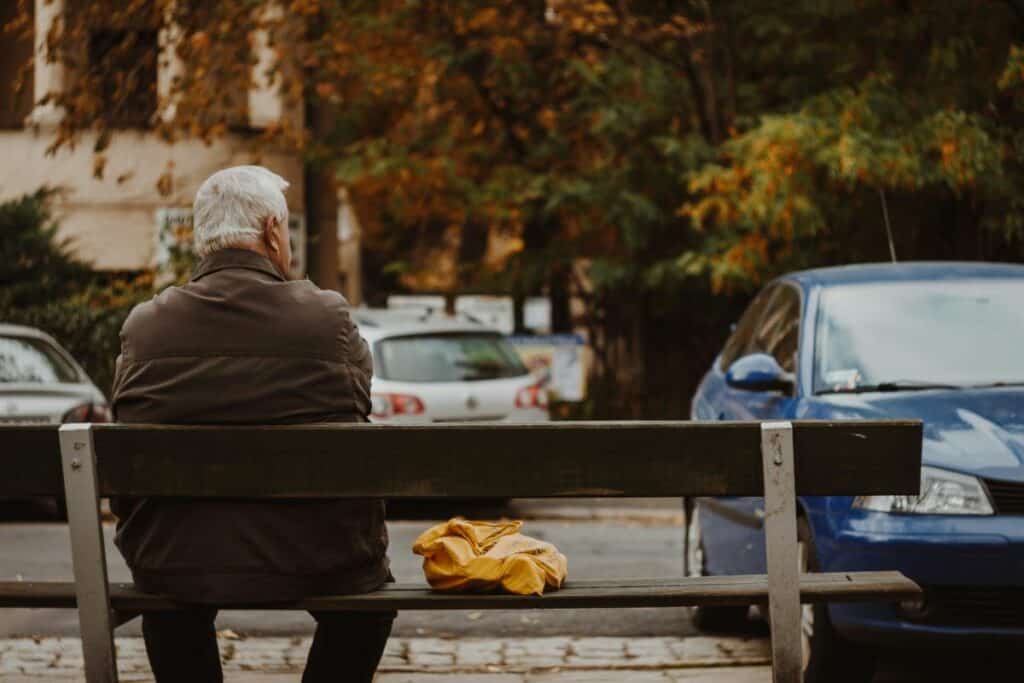Is your town a good place to grow old?

Author: Peter Crumpler
Rev Peter Crumpler is associate minister at St Paul’s Church, Fleetville, St Albans. In his first blog for Faith in Later Life, Peter reflects on the challenges of later life in a society that’s bringing in technological interventions which often exclude, and even penalise, many older people. He also encourages us to use our voices to make our towns good places to grow old.
“Don’t grow old,” a parishioner of advanced years warned me some while back. “You won’t like it.”
Sadly, that dear woman is no longer with us, and I’m a whole lot older than when she offered me that kind advice. But was there wisdom in her words?
It’s true that generally people are living longer and in better health than in generations before. I recently learnt that the average life expectancy of someone born in Britain in 1837 was just 39 years. In London, the average age of death for labourers was just 22. In Manchester, nearly six in ten children died before reaching the age of five.
Thank God for all that progress, and the difference it has made to the lives of millions of people. We should never forget to give thanks and celebrate that achievement.
But there are increasing challenges for older men and women in our communities, and it prompts me to ask the question: is your town or village a good place to grow old?
I’m not talking about the quality of the care homes, the NHS services or public transport – important though they are – but about the everyday lives of older people.
My friend, Maggie Dodd is the ‘Anna Chaplain’ for older people in St Albans, Hertfordshire, the city where I live and minister. She is one of around 300 such chaplains up and down the country. They spiritually support people – of strong, little or no faith – in care homes, sheltered housing or in their own homes. Maggie’s important work is backed by the city’s two Methodist churches.
She has told me how life is becoming harder for older people in the area, and we’ve swapped notes on what we have both observed.
She explained: “Some of the basic services older people need are becoming more difficult to access. I hear about doctor’s surgeries asking for patients to print out their own forms or send photos to or from smartphones. Banks are phasing out high street branches, pushing everyone towards online banking – many older people feel very uneasy about going online, worried of being scammed out of their savings.
“A trip to the shops is also becoming more complicated. Checkouts in supermarkets are increasingly self-service. Mobility can also be affected as car parks often need an app to be uploaded onto a smartphone to park. Many city car parks ask for payment by app – at St Albans City station there is no option to pay by card or cash!”
Maggie is right, and I know of at least one older person who has to phone a friend who has a smartphone, whenever she wants to park her car! The friend has the parking app on her phone, so can make the payment for her.
On a recent visit to an NCP multi-storey car park in the Midlands, I had to pay £3 extra – £8.85 instead of £5.85 to park for three hours – because I did not have the NCP app on my phone! I call that outrageous!
The older people that I meet and talk with at our church and elsewhere are increasingly finding themselves being ‘left behind’ by new technology, and the presumption that they will have the latest apps, and an assortment of them, on their phones.
Many, since the Covid lockdown, have made the transition from using cash to cards – an easier switch for some than for others. But the move to online ordering and payment is proving much more of a challenge.
Last autumn, the charity Age UK launched a hard-hitting campaign, #OfflineandOverlooked, designed to persuade the Government to ensure that everyone is able to choose to access and use public services offline – by phone, letter or face to face as appropriate – rather than constantly being forced down a digital route.
This, says Age UK, “would end the discrimination against millions of older people who are not online or digitally savvy. This means many currently struggle to do routine things like make a medical appointment, order a blue badge for their car or pay to park it.”
The charity has pointed out that the number of older people online has increased substantially over recent years, but there is still a sizable minority who are not online.
In fact, a total of 2.7 million over-65s in the UK do not use the internet at all, equivalent to around one in five (22%) of this age group. This includes almost 500,000 over-65s who had used the internet in the past but don’t do so now, showing that as we age it is not unusual to scale down or cease our online activities altogether.
It’s not just older men and women who are disadvantaged by the move away from people and cash to technology and smartphones. People with poor eyesight or reduced cognitive abilities can also struggle. Some younger people are ceasing to use smartphones, because of concerns about sharing their data.
It’s good that plans to remove the ticket offices at train stations have been shelved, especially as recent research showed that people found themselves paying more for their journeys if they used machines rather than buying tickets from a real person!
It’s not just a question of older people not keeping up with new technology.
This gradual marginalisation of people can leave them feeling lonely and isolated. Loneliness can have a huge detrimental effect on health and wellbeing. Prolonged social isolation and loneliness are the equivalent of smoking 15 cigarettes a day.
Dr Richard Pile, an experienced GP doctor, compellingly set out the health risks of loneliness in a recent Tedx Talk in St Albans.
Older people are being increasingly marginalised when, alongside people of all ages, they should be able to play a full part in our community.
It’s excellent to see that many churches are serious about valuing older people; running special events and activities, ably led by Faith in Later Life Church Champions and others with a heart for those in later life.
But maybe we should be more vocal in our support for older men and women in our towns by pointing out to councils, the NHS and local businesses the impact of moves to new technology, and how they can leave older people disadvantaged – or stranded?
Christians are called to follow Christ’s example and speak out for those on the margins of our society. In today’s increasingly high-tech society, that could be anyone reaching later life…
